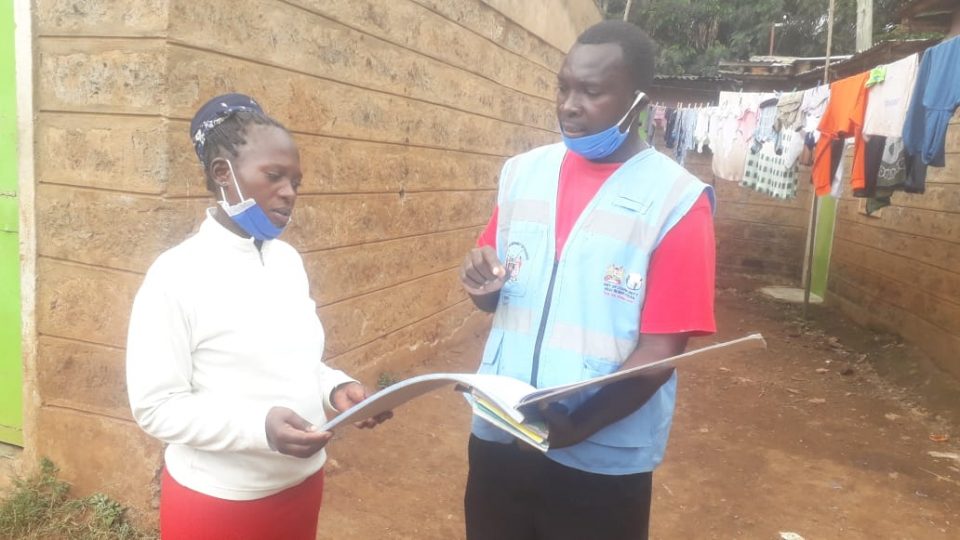CAPTION: Gataka Community Health Unit Wycliffe Tubula engaging Quinta Achieng, beneficiary, at her home in Mashimoni village, Kajiado North constituency
Due to the vastness of the County, the local government depends on the ‘Daktari wa Mashinani’ to implement the universal health care in remote areas
By Albert Lemomo
Community Health Volunteers (CHVs) in Kajiado County are now appealing for government support as Covid-19 pandemic effects continue to bite the economy.
According to Wycliffe Tubula, Chairman of the Gataka Community Health Unit in Ongata Rongai, the CHVs should be classified as a vulnerable group of the society and be considered for a stimulus package to cushion them from pandemic effects.
Tubula told Kajiado Star during a recent interview that the situation is worrying since they have been left to care for patients who are starving and some have abandoned taking drugs.
He noted that through their frequent visits to check on home-based care patients during Covid-19 period the health conditions for those with pre-existing conditions has worsened due to lack of proper diet as most of them have lost their casual jobs.
“The situation on the ground is devastating as we watch patients in dire need of food and we do not have anything to give since we are also hard pressed during this unprecedented time,” said the CHV Chair.
He noted that other CHVs have cut their visits to those patients who fully depend on their services due to the World Health Organization and Ministry of Health guidelines on social distancing to avoid contracting or infecting others with Coronavirus disease.
Tubula added that some of the CHVs who were active before Coronavirus have opted to do other manual jobs in order to provide food for their families as they are not guaranteed any pay at the end of the month.
“We now have only 15 CHVs serving a population of 3,000 patients in the entire Gataka Community Health Unit which is not practical at any given situation,” he noted.
A 27-year-old Quinta Achieng, one of the beneficiaries of the services by the volunteers, said most of the CHVs have left them at a crossroad as the patients’ conditions continue to deteriorate each passing day.
“Patients with communicable diseases including HIV/AIDs, Tuberculosis and those with pre-existing conditions like Hypertension, diabetes, cancer among others are the most affected since they need adequate food and medication on a daily basis,” said Achieng.
However, Joyce Nyambura a CHV at Gishagi slum in Ngong says she has devised a new way to interact with the patients by use of technology to minimize coming into contact that might spread Coronavirus.
“I have to make sure every day that the patients are continuing with their dosage and I remind them by SMS or I even call them,” said Nyambura. “Although some are faced with lack of food which makes it hard for them to take drugs,” she noted.
Nyambura said also lack of basic protective including face masks and gloves to handle patients has posed a threat to the health conditions of the CHVs who also put their lives on the line to save home based care patients.
Due to its vastness Kajiado County highly depends on the CHVs who are referred as ‘Daktari wa Mashinani’ to implement the universal health care in all remote areas of the County as well as informal settlements.
